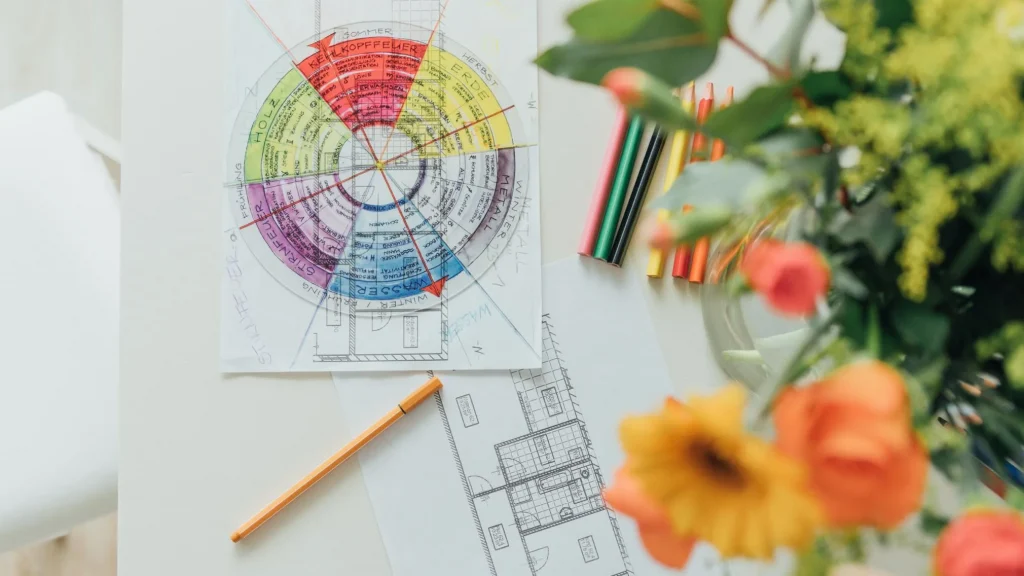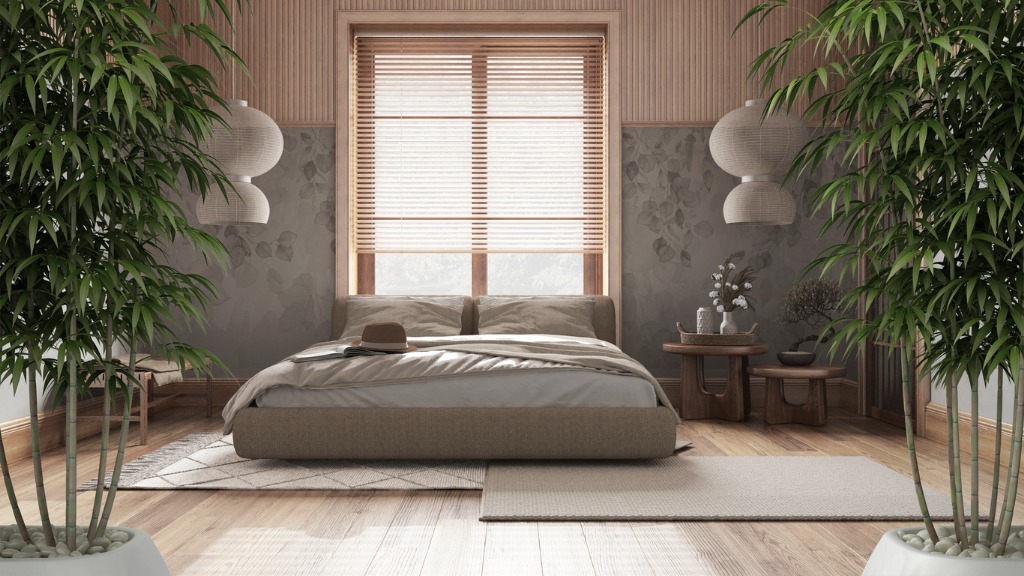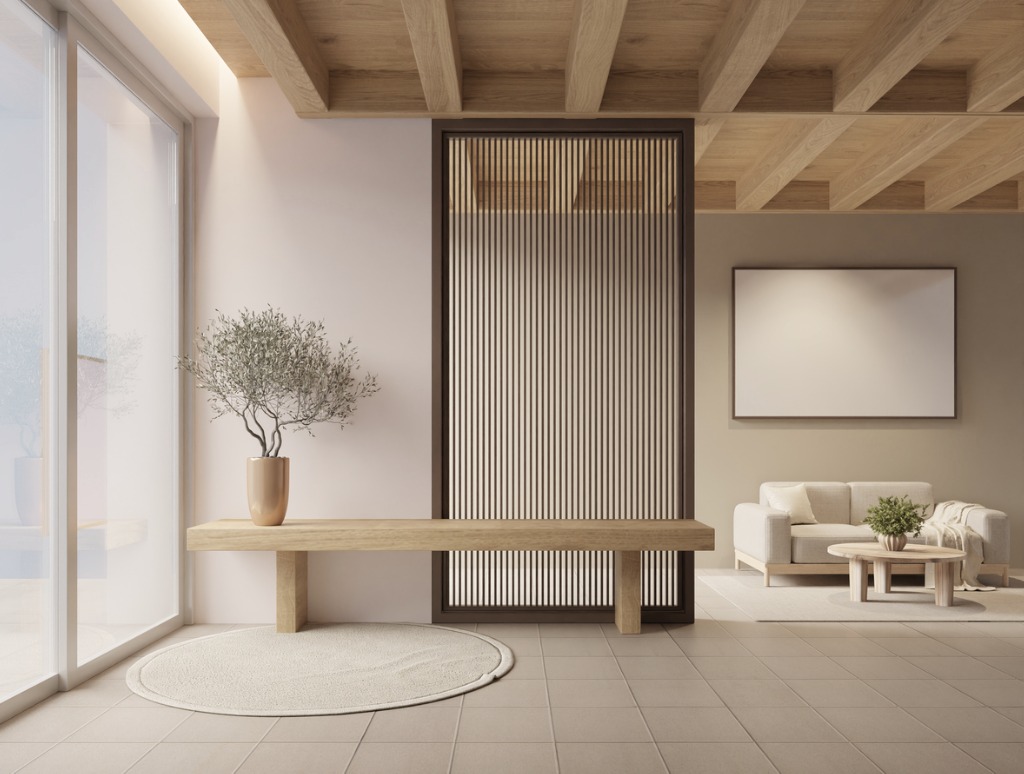Transforming your house into a personal haven can involve simple changes like creating gallery walls or displaying items that reflect your interests. Feng shui, an ancient practice rich in tradition, offers a way to bring balance and positive energy into your home. Insights from feng shui experts can help you align your living space with the natural world, creating an environment that nurtures happiness and creativity.
What is feng shui?
Feng shui is an ancient Chinese art, believed to have originated about 7,000 years ago as it traveled through India and Tibet. The term combines the Chinese words for wind (“feng”) and water (“shui”), which are elements deeply symbolic of balance and harmony in nature.
Some key tenets of feng shui
Feng shui revolves around the concept of balance and utilizes several methods influenced by the natural world to infuse spaces with positive energy. Essential practices include maintaining cleanliness and thoughtful furniture placement to avoid disruptions in energy flow. Here’s a deeper exploration of the foundational tenets of feng shui:
Chi In Chinese philosophy, chi is the life force that permeates everything, connecting the cosmic and the domestic realms. A home bathed in positive chi is one that offers peace and comfort. It’s vital to arrange living spaces to promote a free and seamless flow of this energy.
Yin and Yang Feng shui involves harmonizing opposing forces to foster equilibrium within a space. Yin symbolizes more passive and tranquil energies, suitable for areas like bedrooms. In contrast, yang represents more dynamic and vigorous energies, ideal for livelier areas such as living rooms. The goal is to incorporate a balance of yin and yang in a home to create an environment that is both energizing and restful.
The Bagua Map
A crucial tool in feng shui, the bagua map is used to determine how different areas of a home correspond to various life aspects, including wealth, creativity, and relationships. Typically shaped as an octagon with eight sections around a central circle—representing the emotional and physical well-being of the occupants—this map can be applied over a whole floor plan or within individual rooms to optimize the distribution of energy and support personal aspirations and well-being.

Natural elements
Incorporating natural elements into your home’s décor is a fundamental aspect of feng shui, fostering a connection to the environment and enhancing tranquility similar to that experienced outdoors. There are five key elements you can utilize: Earth, Fire, Metal, Water, and Wood.
Seeing feng shui when choosing a home
When considering feng shui in the process of selecting or building a home, it’s essential to recognize that this philosophy extends far beyond mere furniture arrangement. It involves a holistic approach to harmonizing your space and your personal presence within it.
Feng shui isn’t necessarily complex or costly. Often, even minimal adjustments can significantly enhance the harmony of an environment, depending on your objectives.
Architects frequently collaborate with feng shui specialists when designing both commercial and residential buildings, acknowledging the deep historical roots of the practice. Historically, in ancient China, individuals would consult with feng shui experts not just for home layout but also for choosing the optimal land plot and overseeing the construction process to ensure alignment with feng shui principles.
When evaluating a home or planning a new construction, consider the following feng shui elements:
The Layout of the Home
A deeper rather than a wider floor plan is often recommended in Feng Shui. This design, where the house is further back than wide, encourages the flow of positive energy deeper into your living space and improves its retention. For those exploring existing properties, we offer 3D floor plans for our properties that can help visualize the energy dynamics of a home and determine its suitability for your needs.
Ceiling Heights The height of your ceilings plays a crucial role in maintaining comfort and balance in your home. Ceilings that are too low can make the space feel oppressive, whereas excessively high ceilings might detract from the coziness, particularly in smaller rooms. In larger, open-concept areas, higher ceilings might complement the room’s proportions well. However, in more intimate spaces like bedrooms, it’s beneficial to have moderately high ceilings to preserve a comfortable ambiance. If you find the ceilings too high, adding elements such as chandeliers can create a sense of intimacy without making the space feel cramped.
Bathroom Placement In feng shui, the location of bathrooms is critical due to the less favorable energy typically associated with these spaces. It’s advisable to keep bathrooms at a reasonable distance from bedrooms to avoid the negative influence of bathroom energy and bacteria near resting areas.
By carefully selecting the right plot, opting for an optimal floor plan, making discerning construction choices, and choosing architectural details that resonate with the residents’ energies, you can create a living environment that not only supports the occupants’ health but also aids in realizing their potential.
Harmonizing Your Home with Feng Shui: Inside and Out
In feng shui, the goal is to create a space that feels balanced and uncluttered. This means choosing furniture and decor that fit comfortably within the dimensions of your rooms, avoiding the common mistake of overcrowding your living environment.
Adopting feng shui principles doesn’t necessarily require extensive changes or a large budget; often, small, thoughtful modifications can significantly enhance the energy of your home.
Nature plays a crucial role in feng shui, with each of the five elements—Earth, Fire, Metal, Water, and Wood—bringing unique energies into your living space. It’s essential to maintain a balance among these elements to prevent any single one from overwhelming the others, ensuring that the energy throughout your home remains harmonious.
Mirrors are a particularly effective tool in feng shui, known for their ability to expand the perception of space and reflect energy, making them ideal for brightening and energizing areas that might otherwise feel stagnant. Positioning mirrors properly can significantly enhance the flow of positive energy.
Plants also contribute positively to a home’s feng shui by integrating natural elements into your decor, which can invigorate your living space with vibrant, life-affirming energy. Through thoughtful placement of plants and mirrors, you can create a more balanced and inviting home environment.

The Living Room
In feng shui, the sofa is not just a piece of furniture but a foundational element that anchors the energy of the living room, fostering relaxation and security. Ideally, sofas should be placed against a solid wall to provide a sense of backing and protection. If this isn’t feasible, positioning a sofa table behind the sofa can serve as an alternative to support and stabilize the space.
To maintain the natural flow of energy, or chi, within the room, avoid placing your sofa directly in front of a window, as this can interrupt the incoming energy and compromise the feeling of security. Additionally, ensuring adequate space between furniture pieces allows for a smooth circulation of both energy and people, enhancing the overall ambiance of the room.
The Bedroom
The bedroom is a sanctuary for rest, making the placement of your bed critical to maintaining a peaceful and calming environment. Positioning the bed with a doorway directly at the foot can create discomfort and disrupt the room’s tranquil energy, as it places you in line with potential disturbances from outside the room. A recommended alternative is to place the bed diagonally opposite the door, which offers a stable view of the entrance without direct alignment.
Symmetry also plays a vital role in balancing the bedroom’s energy. This can be achieved by using matching nightstands on each side of the bed, which not only enhances the aesthetic harmony of the room but also promotes balance in the flow of energy, contributing to a more restful and serene atmosphere.

Enhancing Feng Shui in Your Yard
The exterior of your home plays a crucial role in feng shui, providing ample opportunities to cultivate positive energy. A well-maintained and aesthetically pleasing yard not only boosts your home’s curb appeal and potential resale value but also contributes to your overall sense of well-being each time you view your surroundings.
According to feng shui principles, a tidy and orderly exterior allows energy to flow smoothly towards and around your home. Clutter and disarray can hinder this flow, creating stagnation and blocking positive influences. By keeping both the front and backyard neat, you facilitate an environment where energy can circulate freely without obstacles, drawing in positivity and comfort.
Investing time in your yard’s upkeep and thoughtful landscaping can significantly enhance the harmonious energy of your home, making it a more inviting and pleasant space for everyone.

Finding Your Ideal Feng Shui Decor Style
Navigating home decor with feng shui principles can help you create a more balanced and harmonious environment. According to feng shui expert Chan, people typically align with one of two decor styles: those whose spaces are cluttered and may feel overwhelmed by their belongings, and minimalists who might feel something is missing in their sparsely decorated homes.
To determine the best approach for you, a bit of self-reflection can be helpful. Identify which category you lean towards—it doesn’t have to be a perfect fit, but understanding your tendencies can guide your decorating decisions.
For the Cluttered Home: If you find that your space is cluttered, a proactive step is to declutter to make room for new, positive energy. Chan suggests a methodical release of items: let go of nine items over the course of nine days. This action can be transformative, helping to clear out items that no longer bring joy. Donating or discarding things that no longer serve a purpose in your life can refresh your space and mind.
For the Minimalist Home: If your decor is minimalist and you feel the need for more warmth or vibrancy, introducing elements that add color, texture, or nature can be beneficial. Adding plants or stones can enhance the sensory richness of your environment. Items that evoke a “warm and fuzzy” feeling can make your space feel more inviting and comforting.
By adjusting your home decor to better align with your personal style and the principles of feng shui, you can create a living space that supports both your wellbeing and aesthetic preferences.
Finding Balance with Feng Shui: Avoiding Overwhelm
It’s easy to become overwhelmed when trying to apply every feng shui principle to your home. This overzealous application, sometimes referred to as “feng shui paranoia,” can detract from the practice’s intention to create peace and balance. It’s important to recognize that not every space needs extensive modifications to benefit from feng shui.
Adopting a practical approach can be beneficial. If your space generally feels good and functions well, extensive changes might not be necessary. Focusing on the strengths of your environment and implementing thoughtful, purposeful adjustments can enhance your living area without leading to stress.
Rather than striving to adhere to all available feng shui advice, it can be more effective to concentrate on specific areas of your life or home that you feel could benefit from improvement. Identifying a few key aspects you want to enhance and applying feng shui principles to these can make the practice more manageable and meaningful.
This focus on accentuating the positive elements of your home, rather than fixating on potential deficits, encourages a more balanced approach to feng shui, fostering a supportive and harmonious environment.


